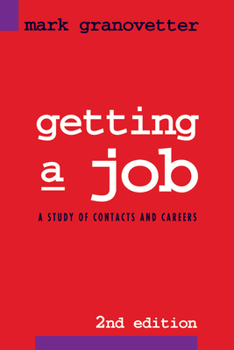Getting a Job: A Study of Contacts and Careers
Select Format
Select Condition 
Book Overview
This classic study of how 282 men in the United States found their jobs not only proves "it's not what you know but who you know," but also demonstrates how social activity influences labor markets. Examining the link between job contacts and social structure, Granovetter recognizes networking as the crucial link between economists studies of labor mobility and more focused studies of an individual's motivation to find work. This second edition is updated with a new Afterword and includes Granovetter's influential article "Economic Action and Social Structure: The Problems of Embeddedness." "Who would imagine that a book with such a prosaic title as 'getting a job' could pose such provocative questions about social structure and even social policy? In a remarkably ingenious and deceptively simple analysis of data gathered from a carefully designed sample of professional, technical, and managerial employees . . . Granovetter manages to raise a number of critical issues for the economic theory of labor markets as well as for theories of social structure by exploiting the emerging 'social network' perspective."--Edward O. Laumann, American Journal of Sociology "This short volume has much to offer readers of many disciplines. . . . Granovetter demonstrates ingenuity in his design and collection of data."--Jacob Siegel, Monthly Labor Review
"A fascinating exploration, for Granovetter's principal interest lies in utilizing sociological theory and method to ascertain the nature of the linkages through which labor market information is transmitted by 'friends and relatives.'"--Herbert Parnes, Industrial and Labor Relations Review
"A fascinating exploration, for Granovetter's principal interest lies in utilizing sociological theory and method to ascertain the nature of the linkages through which labor market information is transmitted by 'friends and relatives.'"--Herbert Parnes, Industrial and Labor Relations Review
Format:Paperback
Language:English
ISBN:0226305813
ISBN13:9780226305813
Release Date:March 1995
Publisher:University of Chicago Press
Length:259 Pages
Weight:0.85 lbs.
Dimensions:0.6" x 6.1" x 9.2"
Customer Reviews
3 ratings
Strength of Weak Ties
Published by Thriftbooks.com User , 17 years ago
This is the study where the famous "Strength of Weak Ties" paper came from -- IMHO, the best named social science paper ever! Worth the price just to understand the importance, and use, of "weak ties" in our social networks. This book is a mix of academic and practical. I have recommended it to several clients and friends who don't mind the academic prose to find pearls of wisdom here. Very useful for people trying to understand how the knowledge-worker job-finding process works. Good for HR folks and those who have been RIFfed. A great supplemental book for an HR class in Talent Mgt.
The science of labor markets
Published by Thriftbooks.com User , 21 years ago
This book is an interesting introduction to the workings of the labor market. The main theory revolves around the fact that contacts within our social circle usually do not have access to information we do not already have; in order to get new information, we need to extend social circles and reach for those with whom we do not have constant contact.Through a very academic approach to the problem, the scientific approach is best to help us understand how people get jobs. I originally read this book as an undergraduate in a labor economics course, and I have recently consulted it again (10yrs later) and found many insights I had not caught the first time around.
how labor markets really work!
Published by Thriftbooks.com User , 22 years ago
Mark Granovetter reveals how people make economic decisions and take economic actions based on the social structure they are embedded in. We are not totally rational beings as the old economists would have us believe -- we are social beings -- influenced by, and influencing those around us. It is how we vote, how we dress, how we think, what careers we pursue and what products we buy. Yet, those immediately around us may not be very useful in helping us find a job! Our close associates know what we know at the same time we know it! Therefore, they are not very useful for telling us something new -- like where a job opening is. To find out about jobs, we don't already know about, we need to go outside of our immediate social circle to connect to people we don't see very often any more[old friends, college chums, old army buddies, former co-workers, old sorority sisters]. They now live in different social circles than we do. These social circles have information not available in our social circle -- some of the info is about job openings.This classic book is still highly relevant and useful after 30 years! The book is somewhat `academic' in parts, but is so full of `gems' that it is worth slogging through the research numbers. Every college graduate should read this book and keep it handy till they retire.





